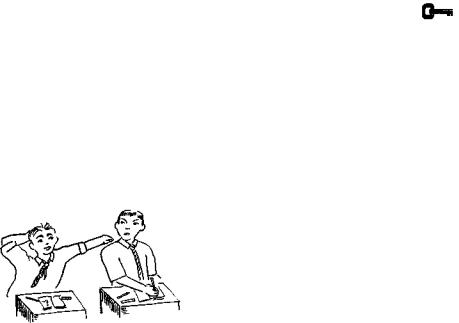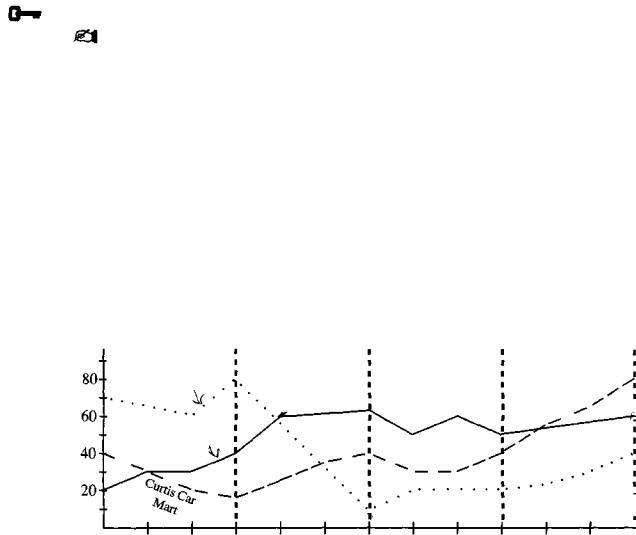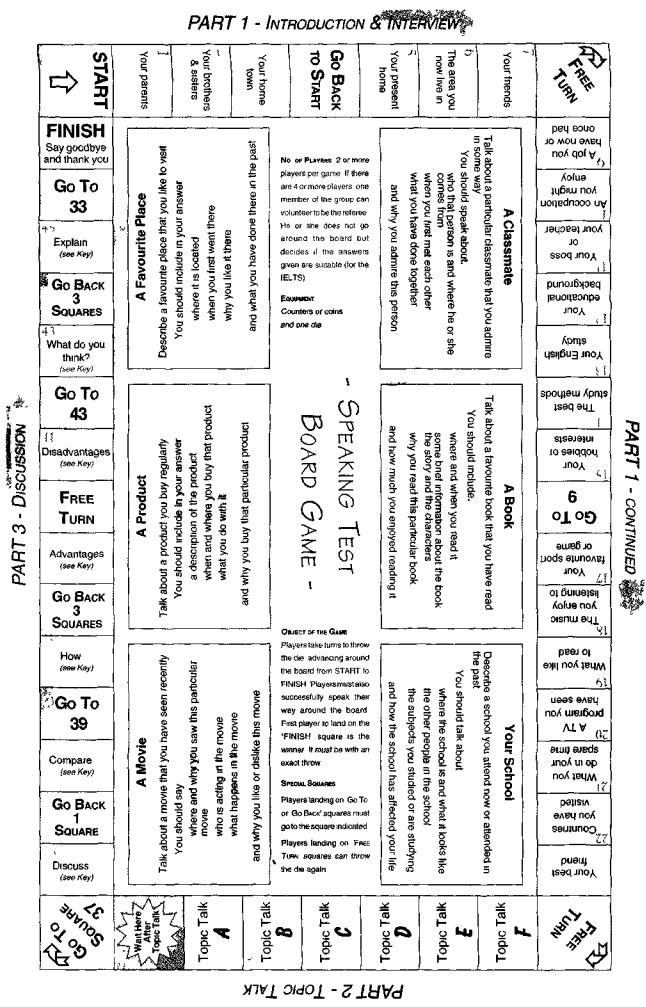
Helpful_Hints_for_IELTS
.pdf
Practice Test Four
Reading Passage 3
Questions 27 - 40
You are advised to spend about 20 minutes on Questions 27 - 40.
A.D.D. - Missing Out on Learning
38-44
40-51-54
Study requires a student's undivided attention. It is impossible to acquire a complex skill or absorb information about a subject in class unless one learns to concentrate without undue stress for long periods of time. Students with Attention Deficit Disorder (A.D.D.) are particularly deficient in this respect for reasons which are now known to be neurobiological and not behavioural, as was once believed. Of course, being unable to concentrate, and incapable of pleasing the teacher and oneself in the process, quickly leads to despondence and low selfesteem. This will naturally induce behavioural problems.
It is estimated that 3 - 5% of all children suffer from Attention Deficit Disorder. There are three maintypes ofAttentionDeficitDisorder: A.D.D. withoutHyperactivity, A.D.D. with Hyperactivity (A.D.H.D.), and Undifferentiated A.D.D.
The characteristics of a person with A.D.D. are as follows:
•has difficulty paying attention
•does not appear to listen
•is unable to carry out given instructions
•avoids or dislikes tasks which require sustained mental effort
•has difficulty with organisation
•is easily distracted
•often loses things
•is forgetful in daily activities
Children with A.D.H.D. also exhibit excessive and inappropriate physical activity, such as constant fidgeting and running about the room. This boisterousness often interferes with the educational development of others. Undifferentiated A.D.D. sufferers exhibit some, but not all, of the symptoms of each category.
It is important to base remedial action on an accurate diagnosis. Since A.D.D. is a physiological disorder caused by some structural or chemically-based neurotransmitterproblem in the nervous system, itresponds especially well to certain psychostimulant drugs, such as Ritalin. In use since 1953, the drug enhances the ability to structure and complete a thought without being overwhelmed by non-related and distracting thought processes.
Psychostimulants are the most widely used medications for persons with A.D.D. and A.D.H.D. Recent findings have validated the use of stimulant medications, which work in about 70 - 80%
145
101 Helpful Hints for IELTS
of A.H.D.D. children and adults (Wilens and Biederman, 1997). In fact, up to 90% of distractibility in A.D.D. sufferers can be removed by medication. The specific dose ofmedicine varies for each child, but such drugs are not without side effects, which include reduction in appetite, loss of weight, and problems with falling asleep.
Not all students who are inattentive in class have Attention Deficit Disorder. Many are simply unwilling to commit themselves to the task at hand. Others might have a specific learning disability (S.L.D.). However, those with A.D.D. have difficulty performing in schoolnotusually because they have trouble learning1, but because of poor organisation, inattention, compulsion and impulsiveness. This is brought about by an incompletely understood phenomenon, in which the individual is, perhaps, best described as 'tuning out' for short to long periods of time. The effect is analogous to the switching of channels on a television set. The difference is that an A.D.D. sufferer is not 'in charge of the remote control'. The child with A.D.D. is unavailable to learn - something else has involuntarily captured his or her whole attention.
It is commonly thought that A.D.D. only affects children, and that they grow out ofthe condition once they reach adolescence. It is now known that this is often not the case. Left undiagnosed or untreated, children with all forms of A.D.D. risk a lifetime of failure to relate effectively to others at home, school, college and at work. This brings significant emotional disturbances into play, and is very likely to negatively affect self-esteem. Fortunately, early identification of the problem, together with appropriate treatment, make it possible for many victims to overcome the substantial obstacles that A.D.D. places in the way of successful learning.
1 approximately 15% of A.D.H.D. children do, however, have learning disabilities
Alternative Treatments for A.D.D. |
Evaluation |
|
|
|
|
EEG Biofeedback |
- expensive |
|
|
- trials flawed - (sample |
|
|
groups small, no control groups) |
|
Dietary intervention (removal of food additives - |
- ineffective |
|
preservatives, colourings etc.) |
- numerous studies disprove link |
|
Sugar reduction (in A.D.H.D.) |
- slightly effective (but only for |
|
small percentage of children) |
||
|
||
Correction of (supposed) inner-ear disturbance |
- undocumented, unscientific |
|
studies |
||
|
||
|
- inconsistent with current theory |
|
Correction of (supposed) yeast infection |
- lack of evidence |
|
(Candida albicans) |
- inconsistent with current theory |
|
Vitamin/mineral regimen for (supposed) genetic |
- lack of evidence |
|
abnormality |
- theory disproved in the 1970s |
|
Body manipulations for (supposed) misalignment |
- lack of evidence |
|
of two bones in the skull |
- inconsistent with current theory |
|
|
|
Figure 1. Evaluations of Controversial Treatments for A.D.D.
146

Practice Test Four
Questions 27-29
You are advised to spend about 5 minutes on Questions 27-29.
Refer to Reading Passage 3 "A.D.D. - Missing Out On Learning", and decide which of the answers best completes the following sentences. Write your answers in boxes 27 - 29 on your Answer Sheet. The first one has been done for you as an example.
Example: The number of main types of A.D.D. is:
a)1
b)2
03
d) 4
Q27. Attention Deficit Disorder:
a)is a cause of behavioural problems
b)is very common in children
c)has difficulty paying attention
d)none of the above
Q28. Wilens and Biederman have shown that:
a)stimulant medications are useful
b)psychostimulants do not always work
c)hyperactive persons respond well to psychostimulants
d)all of the above
Q29. Children with A.D.D.:
a)have a specific learning disability
b)should not be given medication as a treatment
c)may be slightly affected by sugar intake
d)usually improve once they become teenagers
6
8
30-33
43-44
9
Check: 11-15
147

101 Helpful Hints for IELTS
|
Questions 30-37 |
|
|
|
|
|
|
|
|
|
|
|
|
|
6 |
You are advised to spend about 10 minutes on Questions 30 - 37. |
|
|
|
|
|
||||||||
8 |
The following is a summary of Reading Passage 3. Complete each gap in the text by choosing |
|||||||||||||
43-47 |
a word, or phrase from the box below the notes. |
Write your |
answers |
in boxes |
||||||||||
|
||||||||||||||
|
30 - 37 on your Answer Sheet. |
|
|
|
|
|
|
|
|
|
|
|||
|
Note that there are more choices in the box than gaps. You will not need to use all the choices |
|||||||||||||
|
given, but you may use a word, or phrase more than once. |
|
|
|
|
|
|
|||||||
|
|
Attention Deficit Disorder is a neurobiological problem that affects 3 - 5% of all |
||||||||||||
9 |
|
...(Ex:). |
|
.... |
Symptoms include inattentiveness and having difficulty |
|||||||||
|
|
getting |
(30) |
, as well as easily becoming distracted. |
Sometimes, A.D.D. is |
|||||||||
55 |
|
accompanied by |
(31) |
In these cases, the |
sufferer exhibits excessive |
|||||||||
|
|
physical activity. |
|
|
|
|
|
|
|
|
|
|
|
|
|
|
Psychostimulant drugs can be given to A.D.D. sufferers to assist them with the |
||||||||||||
|
(32) |
of desired |
thought |
processes, |
although |
they |
might |
cause |
||||||
55 i 55 |
(33) |
Current theory states |
that medication is |
the |
only |
(34) |
|
|
||||||
|
|
that has a sound scientific basis. This action should onlybe taken after an accurate |
||||||||||||
|
|
diagnosis is made. |
|
|
|
|
|
|
|
|
|
|
|
|
|
|
Children with A.D.D. do not necessarily have trouble learning; their problem is |
||||||||||||
|
|
that they |
involuntarily |
(35) |
their attention |
elsewhere. |
It |
is |
not only |
|||||
|
|
(36) that are affected by this condition. Failure to treat A.D.D. can lead to |
||||||||||||
|
|
lifelong emotional and behavioural problems. Early diagnosis and treatment, |
||||||||||||
|
|
however, are the key to |
(37) |
overcoming learning difficulties associated |
||||||||||
|
|
with A.D.D. |
|
|
|
|
|
|
|
|
|
|
|
|
|
|
|
|
|
|
|
|
|
|
|
||||
|
|
side effects |
successfully |
|
completion |
|
|
adults |
|
|
||||
|
|
medicine |
|
switch |
|
drug |
|
|
|
Ritalin |
|
|
||
|
|
hyperactivity |
organised |
|
losing weight |
|
|
A.D.H.D. |
|
|
||||
|
|
children |
|
attention |
|
remedial action |
|
paying |
|
|
||||
|
|
|
|
|
|
|
||||||||
|
|
|
|
|
|
|
|
|
|
|
|
|
|
|
Check
11-15
148

Practice Test Four
Questions 38 - 40
You are advised to spend about 5 minutes on Questions 38 - 40.
Refer to Reading Passage 3, and decide which ofthe following pieces of advice is best suited for ch child listed in the table below. Write your answers in boxes 38 - 40 on your Answer Sheet.
ADVICE:
Acurrent treatment ineffective - suggest increased dosage of Ritalin.
Bsupplement diet with large amounts of vitamins and minerals.
Cprobably not suffering from A.D.D. - suggest behavioural counselling.
Dbone manipulation to realign bones in the skull.
EEEG Biofeedback to self-regulate the child's behaviour.
Fdaily dose of Ritalin in place of expensive unproven treatment.
6
8
54-58
|
CHILD 1 |
CHILD 2 |
CHILD 3 |
|
|
|
|
Problems |
- does not listen to given |
- often forgets to do |
- excessively active |
|
instructions |
homework |
- unable to pay attention |
|
- loses interest easily |
- sleeps in class |
- dislikes mental effort |
|
- cannot complete tasks |
- disturbs other students |
- disturbs other students |
|
- quiet and withdrawn |
|
|
|
|
|
|
Current |
- EEG Feedback |
- none |
- diet contains no food |
Treatment |
|
|
additives |
|
|
|
- low dose of Ritalin |
|
|
|
|
Best |
(38) |
(39) |
(40) |
Advice |
|
|
|
|
|
|
|
58
OvoaUChecfc
That is the end of Practice Reading Test Four.
Now continue with Practice Writing Test Four on page 150.
Blanks: 11
Grammar 12
&S5
One Answer: 13
Spelling: 14
Legibility: 15
Punctuation: 59*
149

|
101 Helpful Hints for IELTS |
|
|
|
|
|
|
|
59-66 |
PRACTICE WRITING TEST FOUR |
|
||||||
67-75 |
Writing Task 1 |
|
|
|
|
|
|
|
6 |
You are advised to spend a maximum of 20 minutes on this task. |
|
||||||
7i-72- 73 |
Thegraph below shows the monthlyprofits of3 British companies in the |
|
||||||
|
car retail industry for the 2000 financial year. |
|
|
|||||
|
Write a reportfor a university lecturer comparing the performance of |
|
||||||
|
Acme Sports Cars and Branson Motors for the period given. |
|
||||||
8 |
You should write at least 150 words. |
|
|
|
|
|||
|
|
End of 1st Quarter: |
|
End of 2nd Quarter: |
End of 3rd Quarter: |
End of Financial |
||
|
Profit |
Introduction of tax on |
|
|
Media reports boost |
Year: |
||
|
(in£1000s) |
luxurygoods |
|
|
|
in economy |
|
|
|
100- |
|
|
|
|
|
T |
|
|
|
|
|
|
|
|
|
|
|
Acme Sports |
|
|
|
|
|
|
|
|
Cars |
|
|
|
|
|
|
|
|
Branson |
|
|
|
|
|
|
|
|
Motors |
|
|
|
|
|
|
|
|
0 |
Jun |
Ml |
Aug |
Sep |
Oct Nov |
Dec '00 Jan '01 |
Feb Mar'01 |
|
Apr '00 May |
|||||||
2000FinancialYear
75 82 Writing Task 2
6You are advised to spend a maximum of 40 minutes on this task. Write an essay for a university lecturer on the following topic:
77-79- 9O We have been living in |
the nuclear age now for over half a century. Since the |
||
first atomic bombs |
were |
developed, nuclear technology |
has provided |
governments with the |
ability |
to totally destroy the planet. Yet |
the technology |
has been put to positive use as an energy source and in certain areas of medicine.
To what extent is nuclear technology a danger to life on Earth ? What are the benefits and risks associated with its use?
8 You should write at least 250 words.
You are required to support your arguments with relevant information and examples based on your own ideas, knowledge and experience.
OverallCheck:
Grammar |
12 |
& 65 |
|
Spelling: |
4 |
Legibility: |
15 |
Punctuation: |
59 |
That is the end of Practice Writing Test Four.
Check your answers to Practice Test Four with the Answer Key on page 169.
150

Appendix 1
Instructions for Speaking Test Board Game
(see the board for setup instructions)
PART 1: A player lands on a square and chooses one of the other players to ask him or her a question about the item on that square. The other players can ask further questions if necessary.
Important! If the other players consider the answer(s) given too short or not appropriate, they can appeal to a student chosen as a referee, who must decide if the answer is good enough for the player to stay on the square. Otherwise, the player must go back to the square he or she came from.
PART 2: A player landing on a 'Topic Talk' square uses the indicated topic talk card (A-F) and is given 1 minute to prepare a short talk for 1-2 minutes. The other players should each ask 1 further question at the end. Note: Only one Topic Talk' is required of each player, and when the talk is completed, he or she waits on the star square ('Wait Here After Topic Talk') until the next turn.
PART 3: The KEY below is for squares 33-35-37-39-41-43-45. Choose a prompt for the 'Topic Talk' given.
|
33 |
...Talk A |
Discuss the role of movies in society today. |
|
|
Talk B... |
Discuss the role of advertising in modern culture. |
|
|
Talk C... |
Discuss how important tourism is in your country these days. |
|
|
Talk D... |
Discuss the importance of role models for the youth of today. |
|
|
Talk E... |
Discuss whether you think books are too expensive to buy. |
|
|
Talk F... |
Discuss what you think makes a good school. |
|
|
|
|
|
|
|
|
|
35 |
Talk A... |
Compare movies made in your country with movies made in America. |
|
|
Talk B... |
Compare products made in your country with those made overseas. |
|
|
Talk C... |
Compare travel in the past, say a hundred years ago, with travel today. |
|
|
Talk D... |
Compare the differences between students in your own country and those from overseas. |
|
|
Talk E... |
Compare the differences between reading a book in your own language and in English. |
|
|
Talk F... |
Compare the education system in your own country with that of your host country. |
|
|
|
|
|
|
|
|
|
37 |
Talk A... |
How often and where do you go to the movies? Describe the cinema you usually go to. |
|
|
Talk B... |
How do products made these days compare with those made in the past? |
|
|
TalkC... |
How might the tourist industry in your country change in the future? |
|
|
Talk D... |
How can students improve their performance at school? |
|
|
Talk E... |
How useful are books translated from English or from other languages into your language? |
|
|
Talk F... |
How have schools changed in the last hundred years? |
|
|
|
|
|
|
|
|
|
39 |
Talk A... |
What are the advantages of being a movie star or director? |
|
|
Talk B... |
What are some of the advantages of advertising? |
|
|
Talk C... |
What are some of the advantages of travel? |
|
|
Talk D... |
Are there any advantages of being popular at school? |
|
|
Talk E... |
What are the advantages of a book compared with a movie version of a book? |
|
|
Tak F... |
What are some of the advantages of doing well at school? |
|
|
|
|
41Talk A... What are the disadvantages of being a movie star or director?
Talk B... Are there any disadvantages of seeing advertisements everywhere? Talk C... What are the disadvantages of the increased popularity of tourism? Talk D ... What are the disadvantages of being unpopular at school?
Talk E... Are there disadvantages of making books out of paper? Are there any alternatives? Talk F... In what ways does a bad teacher disadvantage students?
43 |
...Talk A |
Do you think television has helped to make the world a better place to live in? |
|
|
Talk B... |
Do you think banning advertisements for alcohol and smoking is worthwhile? |
Why? |
|
Talk C... |
What do you think is the best way to plan a holiday? Why? |
|
|
Talk D... |
Do you think it is harder to study when you are young or when you are older? |
Why? |
|
Talk E... |
In what ways do you think being a writer might be an interesting job? |
|
|
Talk F... |
What sort of equipment do you think is useful in a language school? Why? |
|
|
|
|
|
|
|
|
|
45 |
Talk A... |
Explain what you think movies might be like in a hundred years from now. |
|
|
Talk B... |
Explain some of the differences between a consumer society and a primitive society. |
|
|
Talk C... |
Explain what we can do to protect nature in the future. |
|
|
Talk D... |
Explain the most effective methods of punishment for bad students. |
|
|
Talk E... |
Explain why you cannot learn English only from a book. |
|
|
Talk F... |
Explain how schools might look in the future. |
|
|
|
|
|
151

Appendix 1
152

Appendix 2
TAPESCRIPTS
PRACTICE LISTENING
TEST ONE
Narrator: Listening Test One. This is a practice listening test which resembles the International English Language Testing System Listening Test. The test consists of four sections. Answer the questions as you listen to the recording. Note that the recording is played once only. Please turn to Section 1.
Section 1
Narrator: Section 1. George and Lisa are overseas students studying in Britain. They are returning home for the summer holidays. Look at the Example and Questions 1 to 4.
(10 second pause)
For each of the questions four pictures are given. Decide which picture is the best match with what you hear on the tape, and circle the letter under that picture. First, you have some time to look more carefully at Questions 1 to 4.
(10 second pause)
Now listen to the following conversations, and answer Questions 1 to 4.
Taxi Driver: That'll be £23. Right. There's your change. Have a nice trip. Oh, I'll just get your bags out of the boot.
Lisa: Thank you very much. Now, George, let's find the check-in desk.
George: Yes, but with all the changes they have made here at the airport, I'm not sure where the check-in desk is.
Lisa: Iknow. It's strangeisn'tit? Why don'tweaskforhelp?
George: Good idea. What about that man sitting down over there?
Lisa: Which one? The one with the hat on?
George: But what about the man with the blue uniform and the cap sitting on the trolley? He's bound to know. He looks like he works here.
Lisa: OK, I'll ask him. Excuse me, could you tell me where the check-in desk for FrancAir is please?
Man: Oh, let me think. I haven't worked here very long. The best way to get there would be to turn left at the end here, where the cafe" is, and then go straight ahead until you're opposite the departure gates entrance ... no, no ... sorry ... um, it might be quicker to turn right as soon as you get past the cafe, and keep going along the corridor until you come to the sliding doors at theend. On the left. Yep ...that'sit. All the check-in counters are in a hall there. I'm pretty sure FrancAir is directly to your left as you walk in the hall.
Lisa: Thanks a lot. So, it's left past the cafe", and then right
opposite ...
Man: ... the bookshop. You can't miss it.
George: Come on then, Lisa. We don't want to be late, and I want some time to get a cup of coffee and look around the bookshop.
Lisa: OK, George, but I want to go and wash my hands first. I'll meet you at the check-in desk.
Narrator: George now speaks to the clerk at the check-in counter. Listen to the conversation, and fill in the information
on the Excess Baggage form in the spaces numbered 5 to 13. First, you have some time to look at the form.
(10 second pause)
Now listen to the conversation, and answer Questions 5 to 13.
Clerk: Good morning. Can I help you?
George: Yes. I would like to check in for flight FA-492.
Clerk: Very good. Can I have your ticket and passport please?
George: Yes, here you are.
Clerk: OK. Thanks... er... if you couldjust put your suitcase
on the scales ...
George: Oh, I also have this extra box that I want to take as well.
Clerk: OK. Well, that's extra luggage, so I'11 have to get you to fill out an Excess Baggage DeclarationCertificate. It'11 cost extra, I'm afraid. Let's see ... er ... £40 exactly.
George: Oh well, what's the form for?
Clerk: It's just a form you have to fill out, so if there are any problems, we'll know where you are and how to contact you. So, ifyou can give me a few details, I'll key in the information. OK then. Now, your passport says your name is... Lavilliers. Is that right?
George: Yes. George Lavilliers.
Clerk: George ... er ... L-A-V-I-L-L-I-E-R-S. Good. Now, nationality: French. No, wait a minute. It's a Swiss passport.
George: Well, yes, I live in France, but I was born in Switzerland.
Clerk: Swiss. Very good. Flightnumber: FA-492. Destination
is ...
George: ... Paris.
Clerk: Are you connecting with any other flight in Paris, or will you be staying there?
George: NoJ'mspendingmyholidayinParis. WelLSevres, just outside Paris.
Clerk: OK, so what's the phone number there?
George: Um... let me think... the country code for France is
... er ... 33, and the number is ... 1 - 9 8 6 1 - 4 5 3 7.
Clerk: Right. So that's ... 3 3 1 - 9 8 6 1 - 4 5 3 7.
George: Yes, that's it.
Clerk: And can you tell me briefly what you have in the box?
George: Well, there are some books,just university textbooks from last term, some clothes, and ... oh yeah, my computer disks.
Clerk: OK. Thank you. And what would be the approximate value of the contents?
George: Oh, quite a bit actually. About... yes, about £150. Clerk: That's all. There's your receipt for the box, your passport and ticket, and here's your boarding pass. Gate 7. You can board the plane in about 35 minutes. Have a nice flight.
Narrator: That is the end of Section 1. You now have 30 seconds to check your answers to Section 1.
(30 second pause)
Now turn to Section 2.
153
Appendix 2
Section 2
Narrator. Section 2 You will now hear a short news item Fill in the gaps in the summary of the news item with the correct word or phrase, according to what you hear The first one has been done foryou as an example You now have some time to look at the summary
(20 second pause)
Now listen to the news item, and answer Questions 14 to 21
Kelly: the Minister responsible declined to make any further statement And now with more information on the situation in Lidham we cross to Sophie Roberts at the scene of today's major traffic accident
Sophie: Good evening Yes, Kelly The situation here in Avalon Road, Lidham, is chaotic The death toll is rising with three known fatalities, and a further 14 people receiving treatment at the local St John's Hospital A few moments ago I spoke with the Police Rescue Officer in charge, Chief Inspector McManus, who told me that it would be at least two hours before the northbound lane was reopened, and even longer forthe southbound lane that is still strewn with vehicles He urged all drivers to find an alternative route through Lidham
Kelly: Is there any clear indication as to what caused the disaster'
Sophie: Well, yes, Kelly They are starting to puttogetherthe
accounts |
of the witnesses |
ah, here is |
Chief Inspector |
McManus |
Inspector, could you spare us a moment please'' |
||
InspectorM: Well,yes,justamomentthough |
Asyoucansee |
||
I have a lot on right now |
|
|
|
Sophie: Yes, thank you Now tell me, do you have any more information for us1?
InspectorM: Yes, it seems, from what I can piece together so far from the statements that the witnesses have made, that the dnver of a large articulated lorry lost control of his vehicle as he came down the road there Asyou reaware.itisaverysteep stretch of dual carriageway, and it would have been very difficult for the driver to bring his vehicle back under control coming down that hill There was a queue of traffic turning into Avalon Road from Batty Avenue They wouldn't have been able to do anything I'm sorry, I must get back to work
Sophie- |
Yes, yes of course, Inspector Thank you for |
your time |
I also have with me Mr Ted Higgms, a local |
shopkeeper, who told us that he heard the lorry sounding its horn before the accident
Ted: Well, I wasjustunloading my van outside the shop here, and I heard this horn, you know, much worse than an ordinary car horn, and itjust went on and on, getting louder and louder, and then, I think I was still holding a box of tomatoes and, there was this huge lorry coming down the road, horn going and the lights on, travelling real fast I don't know, maybe about 80 or 90 mph, it came straight down through the lights right at the moment the traffic was turning into the main road, you know, Avalon Road from Batty Avenue Itjust seemed to pickupthecars asit,asitwentalong 1tellyouitwasarealmess
Sophie. Thank you Mr Higgms and, so back to you Kelly, in the studio
Kelly: Thank you Sophie Anyone wanting fiirthennformation regarding those injured in the accident should ring St John's Hospital, which has set up a hotline, and the number is 0 1 7 1 - 3 8 9 - 1 7 7 8 I'll repeat that number 0 1 7 1 - 3 8 9 - 1 7 7 8 And now, with all the news of sport, here is Charles Oakden
Narrator: That is the end of Section 2 You now have 30 seconds to check your answers to Section 2
(30 second pause)
Now turn to Section 3
Section 3
Narrator: Section 3 Next, you will hear an interview on the radio Wnte a word or a short phrase to answer each of the questions numbered 22 to 28 First, you have some time to look at the Example and questions
(10 secondpause)
Now listen to the interview, and answer Questions 22 to 28
Sue: Good afternoon and welcome to "Working Lives" My nameis SueHolt This weekwe continue ourseries by looking at a job that is often thought of as adventurous, exotic, and highly desirable We're going to take a behind-the-scenes look at the airline hospitality industry What is the reality behind the smart uniform and ever ready smile of the flight attendant1? We're lucky enough to have in the studio Juke Nevard, who works for British AirWorld, and is a senior member ofthe cabin crew staff Thank you for finding the time to speak to us I know that you must have a busy schedule Julie: My pleasure Yes, it is a very full-time job, but I think you realise that very early on in your career
Sue: How long have you beeninvolvedin in-flighthospitality1' Julie: Well, I trained for a year at the British AirWorld Training School, and I'd already taken a Diploma in Hospitalityand Tourism afterHeft school so, al2 in all, about 5 years no, more like 6 years
Sue: So your training was at college''
Julie: Well, yes, the preliminary training, but then the British AirWorldTrainingcourseinManchesterwas amorespecialised hospitality course I suppose you could call the Diploma my major professional qualification
Sue: Isee Nowtellme,isthejobasglamorousasmostpeople believe''
Julie: Absolutely not' Oh, of course, there are many good things about the job You know, you never know where you
might be going |
For example, I still get excited when I see the |
new roster for |
the first time Knowing I'll soon be off |
somewhere I haven't been before, on a new route The best thing, of course, is that all the time I'm meeting new people But people don't realise that what I get to see most of is the inside ofhotel rooms, and most hotel rooms are pretty similar Also, it's like, I'm working, but the majority of my passengers are on holiday Sometimes it's hard to deal with all their demands There are times youjust want to shout, "I'm doing my best, I've got ajob to do, leave me alone1", but that doesn't happen very often
Sue: Then tell me, what is your main responsibility during a flight?
Julie: That's hard to say really Well, we're responsible for all the needs and demands ofeach and every passenger, for up
to 10 hours on some long haul flights |
Not to mention the |
safety of the plane and all the passengers |
I suppose, if I have |
to come up with a single answer, it'd be passenger comfort
Sue: Do you find yourself going to the same places often"'
Julie: There are four or five major destinations that we fly to
more regularly than others |
Yes, I' ve got to know some cities |
|
very well |
|
|
Sue: Oh, really9 |
Which destinations are those7 |
|
Julie: Well, there's Pans, Frankfurt, Rome, Kennedy |
||
Sue: Kennedy Airport in |
in Los Angeles9 |
|
Julie: New York |
these are the most frequent destinations |
|
154
